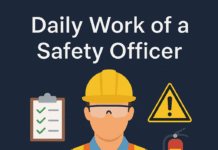
What is the Safety Officer?
Ensuring Workplace Safety for a Safer Tomorrow
What is the Safety Officer? : In today’s fast-paced world, where industries are thriving and technology is advancing at an unprecedented rate, ensuring safety in the workplace has become paramount. A safety officer plays a crucial role in maintaining a secure environment for employees and the general public. In this article, we will delve into the role, responsibilities, and importance of a safety officer.
Understanding the Role of a Safety Officer
Defining the Safety Officer
A safety officer is a dedicated professional responsible for overseeing and enforcing safety regulations and procedures within an organization. They are instrumental in preventing accidents, injuries, and other potential hazards in the workplace.
Qualifications and Training
Safety officers are typically required to have formal education in occupational health and safety. They undergo specialized training to gain the necessary knowledge and skills to carry out their duties effectively.
Workplace Inspections
One of the primary responsibilities of a safety officer is to conduct regular inspections of the workplace. This involves identifying potential hazards, ensuring compliance with safety regulations, and recommending corrective actions.
Emergency Preparedness
Safety officers play a vital role in developing and implementing emergency response plans. They ensure that employees are well-prepared for any unforeseen emergencies, such as fires, chemical spills, or natural disasters.
The Importance of Safety Officers
Preventing Accidents
Safety officers are proactive in identifying potential risks and taking steps to mitigate them. This proactive approach significantly reduces the likelihood of accidents and injuries.
Legal Compliance
Organizations must comply with various safety regulations and standards. Safety officers ensure that their employers adhere to these rules, minimizing the risk of legal repercussions.
Employee Well-being
A safe work environment boosts employee morale and productivity. Safety officers contribute to a positive workplace culture by prioritizing the well-being of all employees.
The Safety Officer in Action
Daily Responsibilities
On a day-to-day basis, safety officers are responsible for conducting safety meetings, risk assessments, and safety audits. They also review incident reports and implement corrective measures.
Communication
Effective communication is a key aspect of a safety officer’s role. They must communicate safety procedures, policies, and updates to all employees, fostering a culture of safety awareness.
Training and Education
Safety officers organize training programs to educate employees about safety protocols. This empowers workers to take responsibility for their own safety.
Incident Investigation
When accidents do occur, safety officers lead investigations to determine the root causes and implement preventative measures to avoid similar incidents in the future.
Conclusion
In conclusion, a safety officer is a linchpin in maintaining a secure and healthy workplace. Their dedication to safety, preventive measures, and crisis management ensures the well-being of employees and the continuity of business operations.
Safety Supervisor vs Safety Officer
How to Become an HSE Engineer from an HSE Officer
Registered Safety Engineer (RSE) Certification
FAQs (Frequently Asked Questions)
- What qualifications are required to become a safety officer? To become a safety officer, one typically needs a bachelor’s degree in occupational health and safety or a related field. Specialized training and certifications may also be required.
- How can a safety officer improve workplace safety? Safety officers improve workplace safety by conducting regular inspections, training employees, and implementing safety protocols. Their proactive approach minimizes risks.
- What is the difference between a safety officer and a safety manager? While both roles are focused on workplace safety, a safety officer typically oversees day-to-day operations, whereas a safety manager may have a more strategic role in developing safety policies and procedures.
- Are safety officers only needed in industrial settings? No, safety officers are needed in various settings, including offices, healthcare facilities, construction sites, and manufacturing plants, to ensure safety compliance.
- How can employees contribute to workplace safety alongside safety officers? Employees can contribute to workplace safety by following safety protocols, reporting hazards, participating in training, and actively engaging in safety initiatives.
Incorporating a safety officer into your organization’s structure is not just a legal requirement but also a moral obligation. It is a step towards fostering a culture of safety, protecting your employees, and securing the future of your business.
























